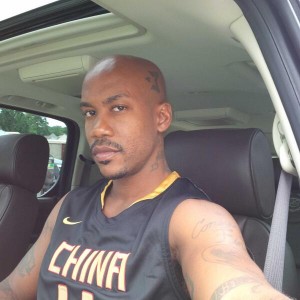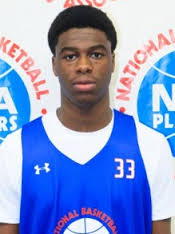 For the last three months, Emmanuel Mudiay hasn’t been able to cross the Guangdong Tigers’ locker room without first passing the cubicle of the team’s starting small forward, Zhu Fangyu.
For the last three months, Emmanuel Mudiay hasn’t been able to cross the Guangdong Tigers’ locker room without first passing the cubicle of the team’s starting small forward, Zhu Fangyu.
Zhu is the Chinese Basketball Association’s all-time leading scorer and a fixture on China’s national team for over a decade. He is also known as the authority figure within the Guangdong roster that sizes up new arrivals and decides if they are serious enough about playing for China’s most successful team.
 The team’s de facto leader has been impressed with what he’s seen.
The team’s de facto leader has been impressed with what he’s seen.
“He likes to learn; he likes to ask questions. [Mudiay] has shown he can change his game to suit the requirements of the team,” Zhu growled approvingly. “Not a lot of young players have that attitude.”
If it sounds like the Guangdong locker room has high standards, that’s because it does. The Tigers are an institution in China, a team that has put a competitive team on the court for every season in the CBA’s 20-year existence. A Chinese version of the Spurs, but with an even better success record: They’ve won eight titles in the last 12 years, and are unique in making overseas players buy into a system rather than simply go after their numbers.
It’s because of this mantra that the organization has previously passed on several big name Americans that have come looking for work in China, including Gilbert Arenas, Tracy McGrady and Allen Iverson. Mudiay will be a lottery pick in June, but he’s going to have to play like a Guangdong Tiger first.
 Mudiay’s arrival in China perhaps wasn’t what he expected 12 months ago when he was one of the most highly recruited high-schoolers in the country. But after committing to Larry Brown’s rebuilding SMU program as a junior, he started having second thoughts as a senior.
Mudiay’s arrival in China perhaps wasn’t what he expected 12 months ago when he was one of the most highly recruited high-schoolers in the country. But after committing to Larry Brown’s rebuilding SMU program as a junior, he started having second thoughts as a senior.
Mudiay wanted to become a bread-winner for his mother, and turning professional at 18 made the most sense if he wanted to financially support his loved ones. There were also rumors of a potential NCAA investigation into Mudiay that may have influenced his diversion from SMU.
A mandatory year of free labor in the NCAA wasn’t going to keep the lights on in the Mudiay household.
Guangdong, a team the other side of the world, was willing to pay him a six-month salary of $1.2 million.
The acquisition of the young guard was obviously a huge story in America but was even bigger news in China. The league had signed well-known Americans before, but this was completely different. There had never been an American teenager brought over, let alone one who was in the conversation to be the second or third overall pick in the 2015 NBA draft.
Moreover, it was amazing to some that Guangdong would be the ones to do it. For years, it had been the CBA’s metronome team and had previously brought in foreigners simply to rebound the ball and give it to the Chinese players.
In years past, the Tigers’ success had been built around a golden generation of players that had come through the youth team setup. Those players include Zhu, but also Yi Jianlian, who played five seasons with Guangdong before moving to the NBA in 2007 (and returning to the CBA five years later). Wang Shipeng, who made his debut the same year as Yi, is another of the Tigers’ cornerstones and has been the best perimeter defender in China for years. All three have been to multiple Olympics and can go home to trophy cabinets filled with several gold medals from the Asian Games and the FIBA Asian Championships.
But like all great teams, Guangdong was getting old. Chinese basketball had changed since their first title in 2004. Now, other CBA teams were cultivating their own promising rosters and reinforcing them with proven overseas talent while the Tigers were simply signing foreigners who were happy to fade into the background.
In two of the last three years, Guangdong lost in the postseason to the Beijing Ducks, who not only had several excellent local players but a duo of dangerous Americans in former Knicks Stephon Marbury and Randolph Morris. Last season, things came to a head when Beijing came to Guangdong in a pivotal Game 5 of the semifinal series and won, meaning the Tigers would be watching the CBA Finals from home for the first time since 2003.
 The Ducks put the ball in Marbury’s hands throughout the series and he responded by averaging 33.2 points. It was a devastating blow to Guangdong’s aura of invincibility. The Tigers had gone into the series with former NBA journeyman Royal Ivey handling the ball, only for Marbury to eat him alive. The Tigers needed a game changer of their own and in Mudiay, they saw the perfect weapon: A player capable of the unpredictable, but also young enough to buy into a team-first ethos without complaining.
The Ducks put the ball in Marbury’s hands throughout the series and he responded by averaging 33.2 points. It was a devastating blow to Guangdong’s aura of invincibility. The Tigers had gone into the series with former NBA journeyman Royal Ivey handling the ball, only for Marbury to eat him alive. The Tigers needed a game changer of their own and in Mudiay, they saw the perfect weapon: A player capable of the unpredictable, but also young enough to buy into a team-first ethos without complaining.
Coming to China has obviously been a huge adjustment for Mudiay, but Guangdong has tried to make the process a little easier. The team also flew out members of his extended family to live alongside him in the Tigers’ home city of Dongguan, including his mother, Teresa.
Guangdong also signed former Texas A&M center Chris Daniels, who, like the Congolese-born Mudiay, spent his formative years in the Lone Star State. It was a small but significant safety net for the teenage guard, as he got used to life as a professional in a country very different from America.
On the court, Guangdong is doing well and, considering this was a team that might have been worried its window had closed eight months ago, things are looking extremely promising after a 17-3 start.
The problem is that Mudiay has not been playing much of a role in this success of late. Over the first 10 games, the Tigers were relatively pleased with what they had paid for. Their teenage import was averaging 17.7 points, 6.0 rebounds, 5.9 assists and 1.3 steals. There were some obvious growing pains – mostly turnovers at costly moments – but nothing for the team to really worry about.
Instead they could point to signs of progress, like Mudiay’s performance against the Qingdao Eagles, a team with playoff aspirations and whose coach, Liu Qiuping, is considered among the best in China. Guangdong won that game comfortably, 127-116, but Mudiay in particular stole the show by going off for 22 points, 13 assists and 11 rebounds.
 Injuries halted things before they could really get going.
Injuries halted things before they could really get going.
Mudiay had to be carried off the court with an injured ankle during a game against Xinjiang.With the recovery time estimated to be a few weeks, Guangdong decided to bring in former Detroit guard Will Bynum to carry the load.
With Bynum running the point, the Tigers have continued to win without Mudiay. Yi continues to be a pick-and-pop threat along with Bynum, while Zhu is nailing 3-pointers with his eyes closed. If anything, it has reinforced how established the system is in Guangdong, when a new American guard can step off the plane and immediately contribute.
The question now is what happens to Mudiay when he returns. Coach Du Feng has talked about his affinity for the teenager, while Yi praised Mudiay on Chinese social media, calling the guard “very good [and] whose learning ability is very strong.”
The problem, though, is that Bynum has thrived in Mudiay’s absence, averaging 21.2 points and 7.4 rebounds in his first five games.
This leaves Guangdong with a dilemma: Give the high-profile Mudiay another chance, or stay with tried-and-true Bynum. The team is playing fantastic basketball with the more experienced Bynum and there is now the growing belief that the veteran will stay on the team.
Daniels is himself a useful complement to Yi in the frontcourt, meaning he can’t be cut. With the team only allowed two active foreign players, the younger point guard might be done. It might sound cruel to stick with Bynum after Mudiay’s bright start but, Guangdong hasn’t been so good for so long without being ruthless every now and again.
Yet even if this is the end for Mudiay – and right now, no one in China is completely sure – his move to the CBA was not in vain.
For starters, the player got what he wanted, which was to be paid for his services. He can also enter the NBA draft having already tested himself against seasoned professionals.
In his first game in China, Mudiay squared off against Marbury, a two-time NBA All-Star who had already entered the professional ranks when the younger player was still in diapers.
Mudiay has seen firsthand what a winning organization looks like and the sacrifices needed to be made by players to get to that level. Despite all of Mudiay’s trials and tribulations, he still has a fan in the Chinese legend Zhu.
“His game is always getting better and its no accident [this is happening],” Zhu said. “He will be worth fifteen million dollars [a year] one day.”
(RELATED: METTA WORLD PEACE’S STINT IN CHINA MAY COME TO PREMATURE END)
Andrew Crawford is a long-time Chinese basketball writer and a former beat reporter in the Chinese Basketball Association. His twitter address is @shouldersgalore.
Should you take flash photography during competitive bowling such as league or tournament play.
Here recently, I was on a five-hour flight from Honolulu to Los
Angeles. One of the first golfing rules of etiquette and a
very important one at that is -“To learn to play properly before going out on the golf course”.